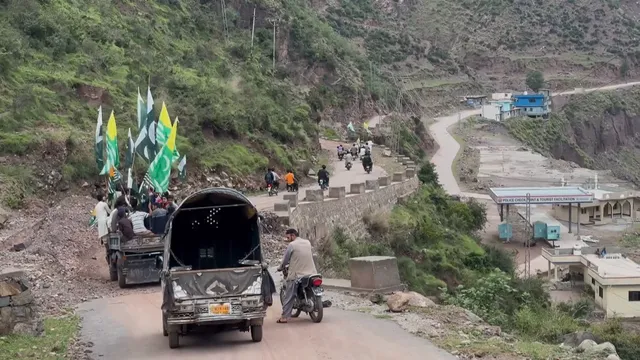
Pakistan commits to ceasefire as tensions escalate in Kashmir
2025-05-14 20:04- A ceasefire agreement was made between India and Pakistan following escalated military tensions in Kashmir.
- Despite the relief the ceasefire brings, residents are still fearful due to the destruction of homes and ongoing military presence.
- Many locals call for peaceful dialogue between India and Pakistan to ensure lasting stability in the region.
Express your sentiment!
Insights
In recent weeks, the region of Kashmir has witnessed increased military confrontation between India and Pakistan, culminating in a ceasefire agreement that was announced to alleviate tensions. The situation became particularly dire just days before the ceasefire, with reports of missile strikes, drone attacks, and heavy artillery fire resulting in significant damage and loss of life. Locals in both Indian-administered and Pakistan-administered Kashmir experienced immense distress, with many homes destroyed and families forced to seek shelter in government facilities. Concerns remain high amongst residents, particularly as people began returning home only to find their properties have been rendered uninhabitable or unsafe due to the recent violence. Notably, the ceasefire has brought relief to some residents, yet there is an underlying fear that hostilities could erupt again, as indicated by statements from Indian officials who claim they have only paused military activities. The impact of this latest conflict has been felt heavily by those living near the Line of Control, with many expressing a desire for both nations to engage in dialogue to resolve their differences peacefully. The emotional toll on the population, especially in border regions like Neelum Valley and Poonch, remains palpable as residents navigate their uncertain futures in a region historically marked by strife.
Contexts
The India-Pakistan conflict over Kashmir is one of the most protracted and complex territorial disputes in modern history, rooted in the partition of British India in 1947. At the time of independence, princely states had the choice to join either India or Pakistan. The Maharaja of Kashmir, Hari Singh, initially opted for independence, but after tribal invasion from Pakistan, he sought military assistance from India. In return, he ceded Kashmir to India, leading to the First Indo-Pakistani War (1947-1948). The conflict resulted in a UN-mediated ceasefire, establishing the Line of Control (LoC) and dividing the region into areas administered by India and Pakistan, but failed to provide a permanent resolution. The UN resolution called for a plebiscite to determine the people's future, which has never been conducted, perpetuating the conflict. The subsequent wars and conflicts have exacerbated the situation, particularly the Second Indo-Pakistani War in 1965 and the Kargil War in 1999. Each conflict further entrenched military and political positions, with both nations asserting their claims over the entire region of Jammu and Kashmir. India views the region as an integral part of its territory, while Pakistan considers it a disputed territory, advocating for the right to self-determination for the Kashmiri people. Throughout the years, various dialogues and peace initiatives have been stalled due to underlying mistrust, terrorism, and domestic political considerations in both nations. The Kashmir Valley has been a focal point of violence and unrest, resulting in significant human suffering. Armed insurgency began in the late 1980s, leading to a heavy military presence in the region and widespread human rights abuses. Various groups, some of which seek independence or integration with Pakistan, have engaged in violent conflict against Indian forces. This insurgency has also been influenced by Pakistan's alleged support of militant groups, complicating the situation further and fueling a cycle of violence and retaliation. Civilians in Kashmir have borne the brunt of the conflict, experiencing incessant instability, economic hardship, and displacement. In recent years, the situation has escalated with increased militarization and the abrogation of Article 370 in August 2019 by the Indian government, which revoked the special status of Jammu and Kashmir. This move was met with widespread condemnation in Pakistan and among many Kashmiris, and it has sparked fears of demographic changes in the region. The international community remains largely focused on the Kashmir issue, with varying degrees of engagement but few tangible solutions. The need for dialogue and resolution remains critical as the conflict continues to impact regional stability and is a flashpoint for India-Pakistan relations, underscoring the necessity for a comprehensive and peaceful resolution.